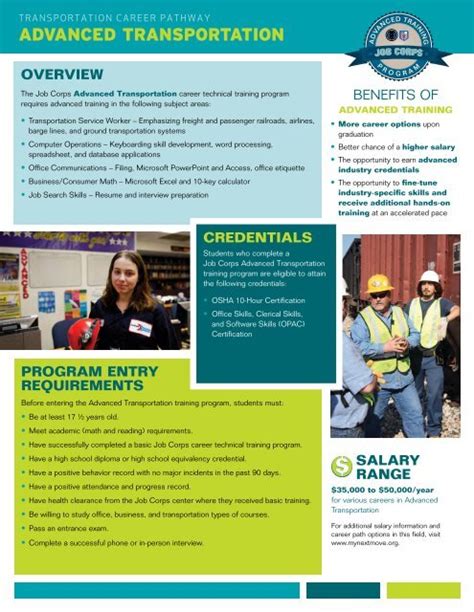Introduction

Job Corps, a renowned program established in 1964, has been instrumental in providing comprehensive education, vocational training, and employment opportunities to at-risk youth. Recognizing the transformative impact of Job Corps, numerous other organizations offer similar programs that empower youth with the skills and resources they need to succeed.
Alternative Programs Similar to Job Corps
1. Career Academies
- Offer specialized vocational training in high-demand fields, often in partnership with local employers.
- Provide hands-on learning experiences, internships, and job placement assistance.
- Example: Project Lead the Way offers STEM-focused academies in over 20 states.
2. Community Colleges
- Provide affordable access to higher education and technical training.
- Offer a wide range of programs, including GED preparation, vocational certificates, and associate degrees.
- Example: The American Association of Community Colleges reports that over 12 million students are enrolled in community colleges nationwide.
3. YouthBuild
- Focuses on providing education and job training to low-income youth who are not in school or employed.
- Offers construction training, leadership development, and assistance with finding employment.
- Example: YouthBuild USA has trained and placed over 230,000 young people in the workforce since its inception.
4. AmeriCorps
- A federally funded program that provides full-time paid service opportunities to youth and adults.
- Participants serve in projects related to education, environmental conservation, and community development.
- Example: In 2022, over 75,000 AmeriCorps members made a difference in their communities.
5. Apprenticeship Programs
- Offer structured on-the-job training and classroom instruction in skilled trades.
- Combine hands-on experience with theoretical knowledge.
- Example: The U.S. Department of Labor reports that over 500,000 apprentices are registered nationwide.
Benefits of Programs Similar to Job Corps
- Education and Training: Provide access to quality education and vocational training, equipping youth with the skills needed for the modern workforce.
- Opportunity for Employment: Connect participants with employers and job placement services, increasing their chances of finding meaningful employment.
- Skill Development: Foster the development of in-demand skills, such as technical expertise, soft skills, and problem-solving abilities.
- Economic Empowerment: Empower youth with the knowledge and skills to earn a sustainable income and contribute to the economy.
- Personal Growth: Promote self-confidence, leadership, and a strong work ethic, fostering overall personal development.
Comparing Job Corps to Alternative Programs
| Feature | Job Corps | Other Programs |
|---|---|---|
| Target Population | At-risk youth | At-risk youth, young adults |
| Program Length | Up to 24 months | Varies |
| Focus | Residential training | Residential or non-residential |
| Cost | Free for income-eligible participants | Varies |
| Educational Component | High school diplomas or GEDs | GEDs, vocational certificates, associate degrees |
| Vocational Training | Wide range of options | Specialized or general |
| Job Placement | Assistance provided | Often provided |
| Success Rates | 70% job placement rate | Vary depending on program |
Strategies for Success
- Develop Strong Partnerships: Collaborate with employers, schools, and community organizations to provide a comprehensive network of support.
- Personalize Education and Training: Tailor programs to meet the individual needs and learning styles of participants.
- Provide Mentorship and Support: Offer participants with guidance, encouragement, and role models to support their success.
- Foster a Positive Learning Environment: Create a safe and supportive atmosphere where youth thrive and grow.
- Address Barriers to Success: Identify and address challenges faced by participants, such as transportation issues or housing instability.
FAQs
-
Who is eligible for these programs?
Eligibility requirements vary by program but generally include factors such as age, income level, and educational status. -
What does it cost to participate?
Many programs are free or offer financial assistance to income-eligible participants. -
How long do these programs typically last?
Program duration varies but can range from a few months to several years. -
What are the success rates of these programs?
Success rates vary depending on the program, but many report high rates of job placement and educational attainment. -
How can I find a program near me?
Local workforce development agencies and community organizations often provide information about available programs. -
What can I do if I am not eligible for these programs?
Explore other community resources, such as career counseling, job training centers, and mentoring programs.
Conclusion
Programs similar to Job Corps play a vital role in empowering youth with the skills and resources they need to achieve success in their personal and professional lives. By providing a holistic approach to education, training, and employment assistance, these programs create pathways for at-risk youth to break cycles of poverty and become productive members of society. By investing in such programs, we can collectively unlock the potential of our youth and create a brighter future for all.
